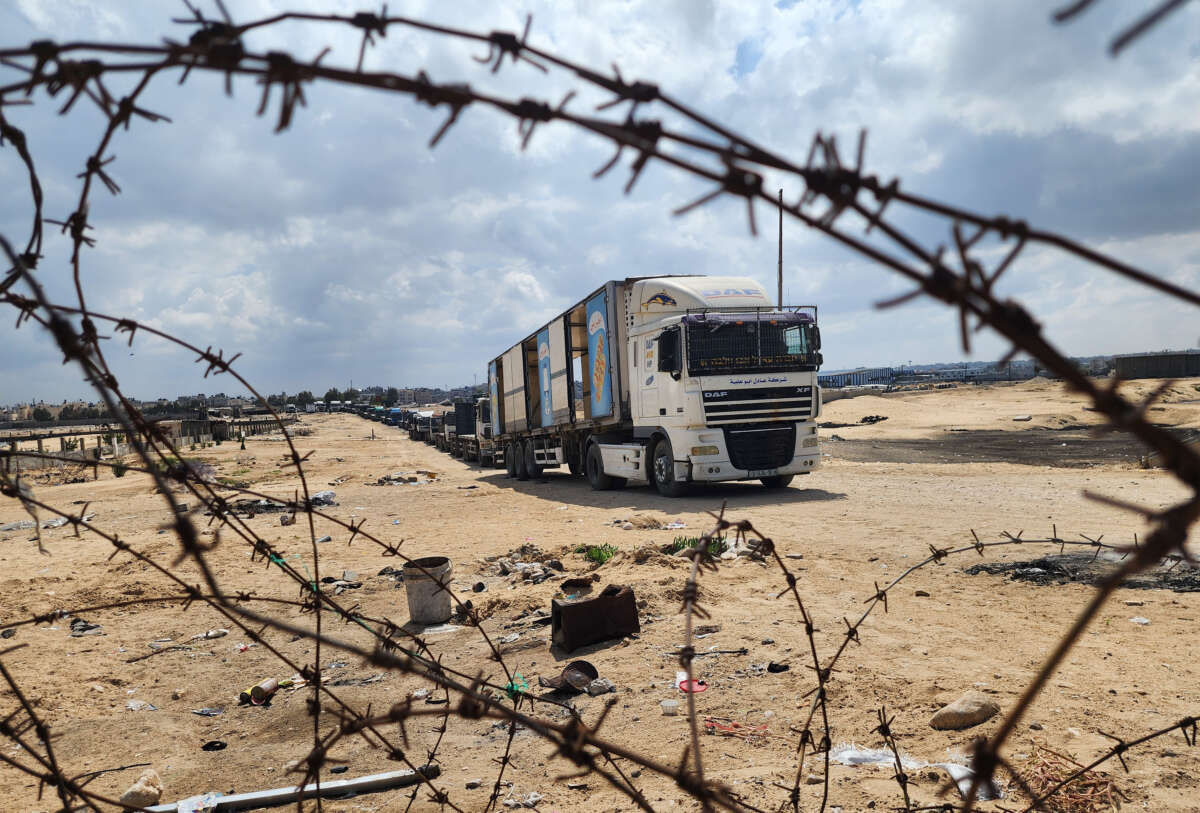The UN is reporting that its stores of food and tents have been completely emptied in parts of Gaza that serve the nearly the entire population of the Strip, as Israel ravages the region by inducing famine and displacing hundreds of thousands of Palestinians.
As of Wednesday, UN officials say their warehouses are empty in areas south of Wadi Gaza, the major river that runs through the middle of Gaza, according to The Guardian. The warehouses belonging to The World Food Programme and UN Relief and Works Agency for Palestine Refugees (UNRWA) in this region serve nearly 2 million Palestinians, out of 2.2 million total in Gaza.
Food and shelter are needed now more than ever in Gaza. The UNRWA reports that 600,000 people have fled Rafah in the last week, including many who have been displaced multiple times. Another 100,000 have been forced to evacuate in the north, where Israeli forces are intensely shelling. Famine has been spreading across Gaza for months, and Israel’s escalation of its already inhumane aid blockade will only make it far worse, humanitarian groups are warning.
“There are no tents in humanitarian warehouses. There are also no stocks of food left with World Food Programme or UNRWA south of the [river],” Georgios Petropoulos, who heads the UN Office for the Coordination of Humanitarian Affairs for Gaza, told The Guardian. “What people have had distributed to them, or what remains on the market, is all that’s left, and we expect that that will be finished soon.”
“Time is running out to get a sustainable crossing open for predictable humanitarian supplies into southern Gaza,” Petropoulos said.
This appears to be a new step in Israel’s starvation campaign, one of near-total deprivation. Humanitarian organizations have been warning for months that the famine could end up being more deadly than the direct military attacks that have killed 35,000 people so far. Terrifyingly, it could be months or years until the true extent of the death toll caused by the famine is known since the official death count does not incorporate Israel’s killing by starvation.
Israel has closed or rendered inaccessible both major border crossings in southern Gaza. No supplies have entered through the Rafah crossing since Israeli forces took it over last week. The Rafah crossing was the primary entry point for humanitarian aid.
The Karem Abu Salem crossing in southern Gaza is also effectively useless for humanitarian groups because of intense fighting and Israeli forces’ presence in the area, UN representatives told The Guardian.
On Tuesday, officials said 54 trucks entered through the Erez crossing on the northern border of Gaza — but this falls far short of the 500 to 600 trucks that the UN says are needed on a daily basis in order to end the humanitarian crisis in Gaza.
Further, UNRWA officials say that it is impossible to combat the famine while there is no water, sanitation or health care services across Gaza.
“We have had some successes in recent days in bringing aid to northern Gaza, which is where the situation was the most acute,” UNRWA director of planning Sam Rose told Al Jazeera English on Wednesday. “But we have seen those gains reversed completely in southern Gaza, which was already facing a situation of catastrophic food insecurity in terms of numbers, in terms of the pace of decline of the situation that has few parallels in modern history.”
“Unless we do something about it in the coming days, an already desperate situation will become far, far worse,” Rose said.
Press freedom is under attack
As Trump cracks down on political speech, independent media is increasingly necessary.
Truthout produces reporting you won’t see in the mainstream: journalism from the frontlines of global conflict, interviews with grassroots movement leaders, high-quality legal analysis and more.
Our work is possible thanks to reader support. Help Truthout catalyze change and social justice — make a tax-deductible monthly or one-time donation today.
